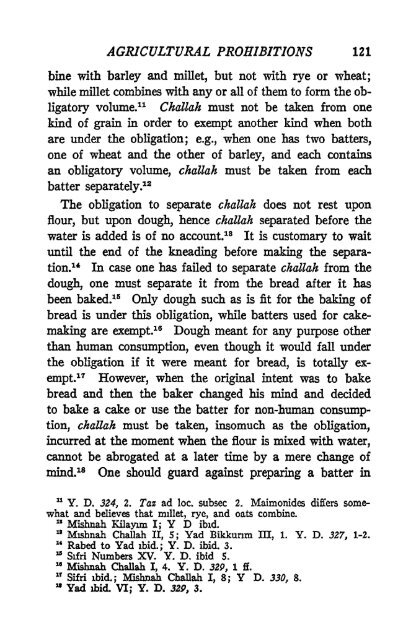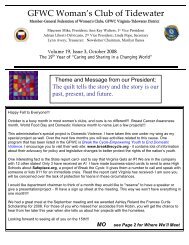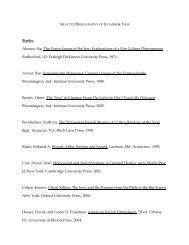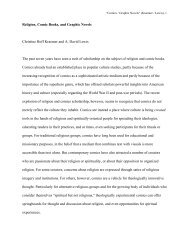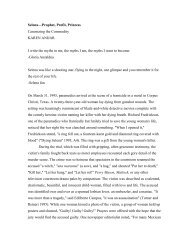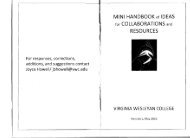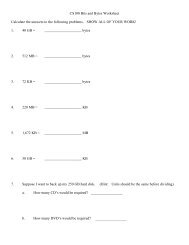Cohn, Jacob. The Royal Table - VWC: Faculty/Staff Web
Cohn, Jacob. The Royal Table - VWC: Faculty/Staff Web
Cohn, Jacob. The Royal Table - VWC: Faculty/Staff Web
You also want an ePaper? Increase the reach of your titles
YUMPU automatically turns print PDFs into web optimized ePapers that Google loves.
AGRICULTURAL PROHIBITIONS 121<br />
bine with barley and millet, but not with rye or wheat;<br />
while millet combines with any or all of them to form the obligatory<br />
volume.11 Challah must not be taken from one<br />
kind of grain in order to exempt another kind when both<br />
are under the obligation; e.g., when one has two batters,<br />
one of wheat and the other of barley, and each contains<br />
an obligatory volume, challah must be taken from each<br />
batter separately. 12<br />
<strong>The</strong> obligation to separate challah does not rest upon<br />
flour, but upon dough, hence challah separated before the<br />
water is added is of no account. 18<br />
It is customary to wait<br />
until the end of the kneading before making the separation.<br />
1* In case one has failed to separate challah from the<br />
dough, one must separate it from the bread after it has<br />
been baked, 15 Only dough such as is fit for the baking of<br />
bread is under this obligation, while batters used for cake-<br />
making are exempt. 16 Dough meant for any purpose other<br />
than human consumption, even though it would fall under<br />
the obligation if it were meant for bread, is totally ex-<br />
However, when the original intent was to bake<br />
bread and then the baker changed his mind and decided<br />
empt. 17<br />
to bake a cake or use the batter for non-human consump-<br />
tion, challah must be taken, insomuch as the obligation,<br />
incurred at the moment when the flour is mixed with water,<br />
cannot be abrogated at a later time by a mere change of<br />
mind. 18 One should guard against preparing<br />
a batter in<br />
11<br />
Y. D. 324, 2. Taz ad loc. subsec 2. Maimonides differs somewhat<br />
and believes that millet, rye, and oats combine.<br />
M<br />
Mishnah Kilayim I; Y D ibid.<br />
*<br />
Mishnah Challah II, 5; Yad Bikkunm HI, 1. Y. D. 327, 1-2.<br />
"<br />
Rabed to Yad ibid.; Y. D. ibid. 3.<br />
15 Sifri Numbers XV. Y. D, ibid 5.<br />
M Mishnah Challah I, 4. Y. D. 329 1 1 ff,<br />
" Sifri ibid.; Mishnah Challah I, 8; Y D. 330, 8.<br />
Yad ibid VI; Y. D. 329, 3.


